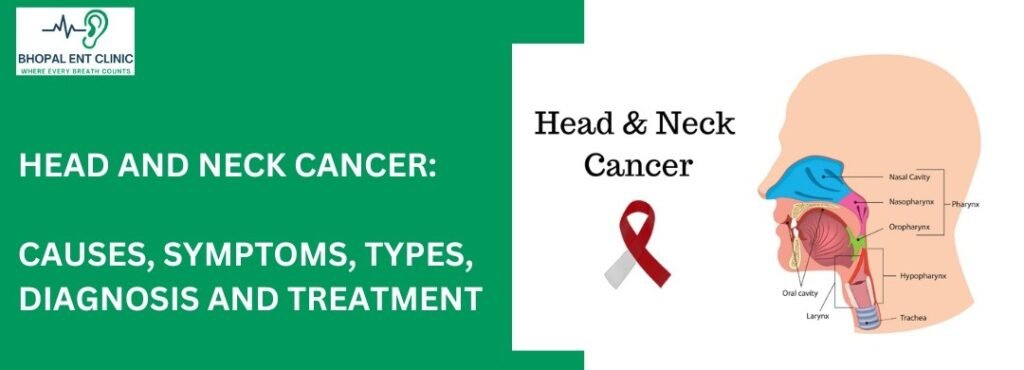Head and Neck cancer
Leading Head and Neck Cancer Specialist in Bhopal Offers Expert Care and Treatment
Head and neck cancer is a disease that starts in the tissues and organs of the head and neck and can be treated by the Best Head and Neck Cancer Surgeon in Ayodhya Bypass, Bhopal. They include Malignancies of the larynx. Throat Lips Mouth Nose Sinuses Thyroid salivary organs Head and neck cancers account for over 30% of all malignant growths in Indians. Dr. Shalini Jadia is a Head and Neck Cancer Specialist in Bhopal.

The majority of head and neck malignancies are squamous cell carcinomas. This type of cancer develops in the flat squamous cells that make up the thin layer of tissue on the surface of the head and neck. Some parts of the head and neck have a layer of moist tissue called the mucosa that sits directly beneath this lining, known as the epithelium. Carcinoma in situ refers to cancer that only affects the squamous layer of cells. Invasive squamous cell carcinoma occurs when cancer has progressed beyond the cell layer into deeper tissue. Cancer of unclear primary is a term used when doctors are unable to determine where the cancer began.
Various Types of Head and Neck Cancer highlighted by Dr. Sadat Qureshi
Laryngeal and hypopharyngeal cancers: The larynx is generally known as the voice box. This tube-shaped organ in the neck is essential for respiration, speech, and swallowing. It is situated at the apex of the windpipe, or trachea. At times, the hypopharynx is referred to as the gullet. It is the lower portion of the throat that protects the larynx. Learn more about laryngeal and hypopharyngeal cancers.
Nasal cavity and paranasal sinus cancers
The nasal cavity is the space right behind the nose where air flows before entering the throat. The nasal cavity is surrounded by air-filled chambers known as the paranasal sinuses. Learn more about the nasal cavity and paranasal sinus carcinoma. Dr. Sadat Qureshi is a Head and Neck Cancer Specialist Near Sector H, Bhopal, Madhya Pradesh.
Oral and oropharyngeal carcinoma
The oral cavity contains the mouth and tongue. The oropharynx is the middle of the throat, extending from the tonsils to the tip of the voice box. Learn more about oral and oropharyngeal cancers.
Saliva gland cancer
The salivary gland generates saliva. Saliva is the fluid that is secreted into the mouth to keep it moist and contains enzymes that begin to break down meals. Learn more about salivary gland cancer.
Nasopharyngeal carcinoma
The nasopharynx is an air route in the top region of the throat, behind the nose. Discover more about nasopharyngeal carcinoma.
Causes of head and neck cancer include
- Chewing tobacco and betel nuts,
- Chewing gutka, and
- excessive and persistent alcohol use
- Additional factors could include radiation exposure,
- Epstein-Barr virus,
- Human papillomavirus,
Gastroesophageal reflux disease (GERD), elevated red meat consumption, Inadequate nutrition, and vitamin deficiencies.
Signs and symptoms of head and neck cancer as observed by a head and neck cancer Specialist Near Gulmohar Path, Bhopal.
- Swelling,
- Chronic sore throat,
- Changes in Tone
- Ear infection
- Long Cough
- Unknown Loss of Weight
- Lasting Mouth Pain
- Bleeding or blockage of the nose
- Red or white? Patches
Head and neck cancer treatment is provided by Dr. Shalini Jadia Best Head and Neck cancer Surgeon in Bhopal, Madhya Pradesh.
- Surgery involves removing the cancerous tumor as well as the borders of healthy tissue around it.
- Radiation Therapy: External radiation Cancer cells receive targeted radiation. Brachytherapy involves injecting electromagnetic fields directly into or around the tumor.
- Chemotherapy: Systemic chemotherapy kills cancer cells all over the body.
- Targeted therapy refers to medications that target specific molecules involved in cancer growth and progression.
- Immunotherapy helps the immune system detect and fight cancer cells.
- Reconstructive Surgery: Following tumor removal, reconstructive surgery may be used to restore function and attractiveness.
FAQs
A cancerous growth in the head or neck can stop food or liquids from passing down the throat. Additionally, weaker muscles may impair normal swallowing and breathing. Consult the Best Head and Neck Cancer Surgeon in Ayodhya Bypass, Bhopal for expert guidance.”
Yes, Cancer cells can move to the lymph nodes. In other situations, they may spread to the lungs, liver, bone, kidney, and adrenal glands. The spread is the process by which cancer cells move and expand.
Yes, Even before cancer therapy, a tumor in the head or neck can affect speech. Exercises for the jaw, tongue, lips, or larynx performed prior to and following treatment may enhance muscular strength and speech ability.
It might last for months or even years after treatment is completed. These negative effects may have a long-term impact on the patient’s quality of life and capacity to perform daily tasks.


